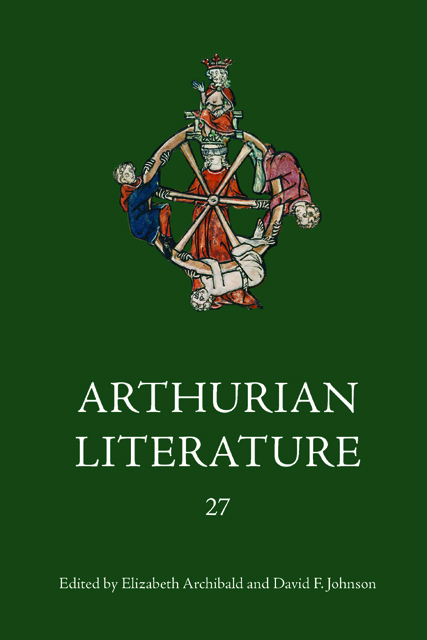Book contents
- Frontmatter
- Contents
- General Editors’ Foreword
- List of contributors
- I Commemoration in La Mort le roi Artu
- II ‘… “if indeed I go”’: Arthur’s Uncertain End in Malory and Tennyson
- III The Intruder at the Feast: Negotiating Boundaries in Medieval Insular Romance
- IV What Women Really Want: The Genesis of Chaucer’s Wife of Bath’s Tale
- V Monstrous Appetite and Belly Laughs: A Reconsideration of the Humour in The Weddyng of Syr Gawen and Dame Ragnell
- VI Speaking (of) Treason in Malory’s Morte Darthur
- VII Lancelot of the Laik: A Scottish Mirror for Princes
- VIII Prince Arthur’s Archers: Innovative Nostalgia in Early Modern Popular Chivalry
- Miscellaneous Endmatter
VIII - Prince Arthur’s Archers: Innovative Nostalgia in Early Modern Popular Chivalry
Published online by Cambridge University Press: 18 February 2023
- Frontmatter
- Contents
- General Editors’ Foreword
- List of contributors
- I Commemoration in La Mort le roi Artu
- II ‘… “if indeed I go”’: Arthur’s Uncertain End in Malory and Tennyson
- III The Intruder at the Feast: Negotiating Boundaries in Medieval Insular Romance
- IV What Women Really Want: The Genesis of Chaucer’s Wife of Bath’s Tale
- V Monstrous Appetite and Belly Laughs: A Reconsideration of the Humour in The Weddyng of Syr Gawen and Dame Ragnell
- VI Speaking (of) Treason in Malory’s Morte Darthur
- VII Lancelot of the Laik: A Scottish Mirror for Princes
- VIII Prince Arthur’s Archers: Innovative Nostalgia in Early Modern Popular Chivalry
- Miscellaneous Endmatter
Summary
The popular reception of King Arthur in the early modern period did not depend solely on texts. While Edmund Spenser ensured that King Arthur would play a role in early modern England's literary high culture even as historians debated his historicity, there is evidence that Arthur remained important more popularly, not just as entertainment but as a way of expressing the martial and social aspirations of a broad class of society. Prince Arthur's Archers, a group of London archers who assumed Arthurian identities, flourished. The ease with which they adapted Arthurian materials for their own use shows the continued vitality of chivalry outside its traditional social class. The participation of non-aristocratic townsmen in military culture, their roles mediated by ideas of the Round Table, shows that urban audiences could approach the Arthurian legend not as appreciative outsiders but as people with a stake in chivalric tradition. Yet Prince Arthur's Archers are largely forgotten. If Shakespeare's Justice Shallow had not referred to them in Henry IV Part 2 (III.ii.257), and if Spenser's schoolmaster Richard Mulcaster had not been a member, their obscurity might be even more complete. In 1930, when Charles Millican wrote an intriguing paper on the possible influence that Mulcaster and Prince Arthur's Archers might have had on the young Spenser, he had no ready way to account for their enthusiastic engagement with the tradition: ‘the Elizabethan interest in the Arthurian legend is part of a primitivistic movement which does have its ludicrous side, nevertheless this ludicrousness comes not from the fact that there was a revival of interest in the Arthurian legend. The ludicrousness comes … from the interests of the tradespeople.’ But the interest of the tradesmen may not be ludicrous after all; instead, it may signal changes to chivalry that have been overlooked or misunderstood. Chivalry was moving beyond the strictly aristocratic. Prince Arthur's Archers provide evidence of the way in which non-aristocratic men adapted chivalric values to understand their own roles in martial culture and to express their ambitions. In turn, this suggests that early modern reception of Arthurian literature may have been shaped by audience identification with knightly characters.
- Type
- Chapter
- Information
- Arthurian Literature XXVII , pp. 179 - 198Publisher: Boydell & BrewerPrint publication year: 2010



